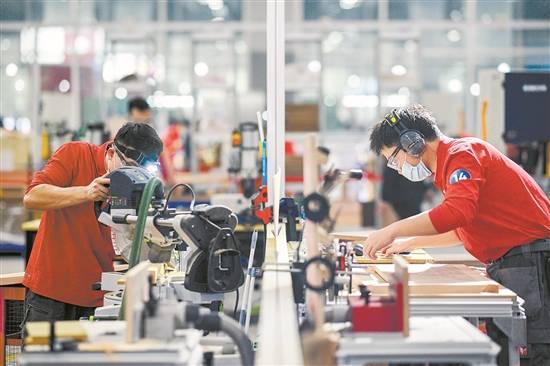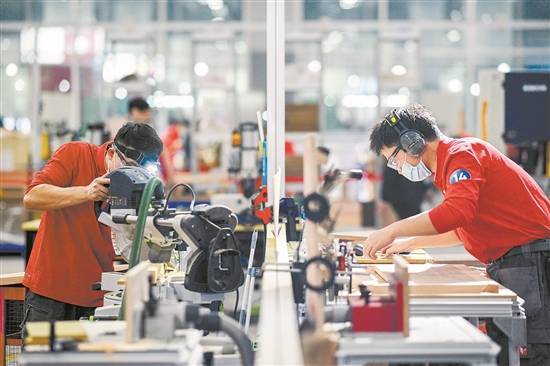| Photo by Song Jinyu Liang Yu, reporter of Yangcheng Evening News at the scene of the vocational skills competition |
Yangcheng Evening News reporter Cui Wencan
Recently, the 34th meeting of the Standing Committee of the 13th National People’s Congress voted to approve the newly revised Vocational Education Law. This is the first major revision of the law since it was enacted in 1996, and it will take effect on May 1, 2022.
What should be paid attention to in the newly revised Vocational Education Law? What benefits will it bring to Guangdong? How will vocational college students benefit from this? A reporter from the Yangcheng Evening News interviewed Liao Yi, a national inspector and president of Guangdong Shaoguan College, to explain what kind of “imaginary space” the revision of this law will leave for the development of vocational education.
Leave imagination and development space for the development of vocational education
Yangcheng Evening News: Why was the Vocational Education Law revised after 26 years?
Liao Yi: Vocational education cultivates technical and skilled talents needed for economic and social development. After 1996, especially since the 18th National Congress of the Communist Party of China, the economic structure and industrial development of our country have undergone major changes, and the demand for talents in vocational education has also changed. , or the internal structure, scale and quality are also changing.
In the past, the scale of vocational education in our country was relatively small, the level was relatively low, the professional structure was not reasonable enough, and the quality of personnel training was not high enough. In addition, from the perspective of the development of international vocational skills and vocational education, our country is indeed different from the vocational education of some European and American countries. The Vocational Education Law of 1996 has not adapted to the actual situation, so the revision of the law is also to meet the needs of talents for the adjustment of industrial structure.
Yangcheng Evening News: What adjustments are worth paying attention to in this overhaul?
Liao Yi: We can see that the country’s understanding of vocational education is getting clearer and clearer, and the path is getting clearer. First of all, this amendment greatly improves the status of vocational education. As pointed out in Article 3, vocational education and general education are different types of education and have equal importance. It is very difficult to realize that vocational education is type education, not level education.
In the past, high schools were mainly used to meet the requirements of the general vocational ratio, but the “base” of the pyramid of vocational education was in secondary vocational education. The “base” has a large base, and there is also a “spire”. In the first three years, the State Council’s one-million-dollar expansion of higher vocational colleges has opened up the channels from secondary vocational education to higher vocational education, and it has been opened up well. Now the problem is to get through from higher vocational education to undergraduate, and then to professional masters and professional doctors. A few years ago, they were promoted from higher vocational education to undergraduate through college promotion, but the students of junior college vocational education were admitted to ordinary undergraduates, which is equivalent to returning to the ordinary undergraduate sequence, so the system of vocational education has not been established.
Article 14 also clarifies that vocational education and general education are integrated with each other, and vocational education at different levels is effectively connected to serve the modern vocational education system of lifelong learning for the whole people. Horizontal connection, vertical connection, vertical and horizontal integration, and the establishment of a modern vocational education system play an important role in improving the status of vocational education.
For another example, Article 17 mentioned that promoting the construction of a national credit bank for vocational education, and promoting the integration and mutual recognition of learning outcomes between vocational education and general education; As mentioned in Article 51, those who have received higher vocational education and whose academic level has reached the degree standards prescribed by the state may apply for the corresponding degree in accordance with the law. It should be noted that there is no degree to be awarded here, so another feature of this revision is that it leaves a lot of room for imagination and development for the development of vocational education.
All of the above are of great benefit and promotion to the development of vocational education. I think this amendment is a milestone for the development of vocational education in China.
Educational restrictions are no longer limited, and vocational school students are welcome to find jobs
Yangcheng Evening News: What benefits does this revision bring to Guangdong?
Liao Yi: Guangdong has a highly developed market economy and advanced manufacturing industry. However, when we went to investigate enterprises in Guangdong, all enterprises have a problem: there is a shortage of good skilled workers. When the status of vocational education improves, students feel that there is a way out for vocational education, and parents are willing to let their children go to vocational colleges, then the reserve of technical and technical talents with vocational skills will increase. In terms of enterprise development, it is easy to recruit people, and students can improve their level through this type of learning, so it is a major benefit for promoting enterprise transformation and upgrading.
This amendment has also mobilized the enthusiasm of the industry to organize vocational education. For example, Article 9 mentions that the state encourages various levels and forms of vocational education, promotes diversified school running, and supports social forces to participate in vocational education on an equal footing; , provide financial, fiscal, land and other support in accordance with regulations, implement education surcharge, local education surcharge reduction and exemption, and other tax and fee preferences.
Literally, the law gives support and rewards to deeply involved enterprises, and in fact it also promotes industrial development and the integration of production and education. Now I feel that many large enterprises are considering intervening in the development of vocational education, and they are willing to do it because they believe that vocational education can solve the problem of enterprise employment, and enterprises can put their own production standards into teaching.
Guangdong is a major province of vocational education, and students in vocational education account for about 10% of the country. Guangdong is also a province with a large economy and is a region that will play a leading role in the reform of vocational education in the future.
Yangcheng Evening News: We have noticed that the revision mentioned that vocational school students have the same opportunities for further education and employment as ordinary school students. Will this revision change the relatively “vulnerable” status of vocational education students seeking employment?
Liao Yi: There are about 10 million graduates nationwide this year, of which more than 1 million are employed in Guangdong. Article 53 of the newly revised Vocational Education Law mentions that when organs, institutions, and state-owned enterprises recruit and recruit technical and technical personnel, the technical skills level is an important condition for recruitment and employment. Now, whether it is for public institutions, civil servants or enterprises, many are recruiting technical and skilled talents. There were restrictions on academic qualifications in the past, but now the “barrier” does not exist, so it is good for vocational college students.
Yangcheng Evening News: Do you think this revision will also promote a series of reforms within vocational education?
Liao Yi: It definitely has an impact. The revision of the Vocational Education Law is of great benefit to vocational education, but the positioning, scale, structure, level, quality and professional structure of vocational education itself, as well as the structure of personnel training, must change. After the revision of the law, the status of vocational education has been higher, and the social needs are larger. If we run schools at a low level, with inaccurate professional orientation, lack of practical conditions, low quality of teachers, and inability to cultivate talents needed by society, there will be pressure within vocational education.
In addition, the revision will also promote investment in vocational education. For a long time, our country’s investment in vocational education has been lower than that in general education. In recent years, we have seen that some problems in vocational education have a lot to do with investment, and promoting investment also promotes the reform and development of vocational education itself. The society gives equal treatment to students in vocational colleges, but it does not guarantee certain employment. If the comprehensive quality, professional ability and professional quality of people trained by vocational colleges are not high, even if the employer lowers the educational threshold, they will still not be able to enter.
After the revision of the law, major changes will occur in vocational schools in terms of the reform of teaching concepts, the reform of talent training models, the adjustment of professional orientation, the optimization and improvement of school-running conditions, and the improvement of teachers’ quality. So it will prompt a series of reforms within the vocational education system.
 Return to Sohu, see more
Return to Sohu, see more
Editor:
Disclaimer: The opinions of this article only represent the author himself, Sohu is an information publishing platform, and Sohu only provides information storage space services.
